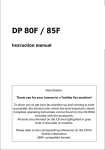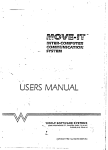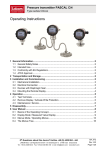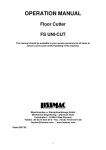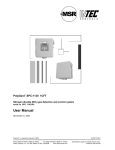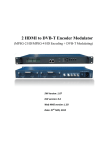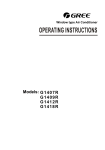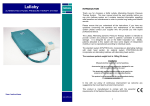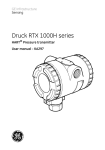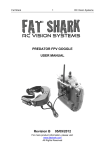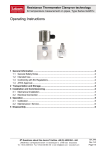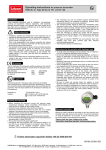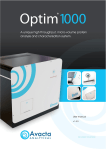Download BTA-060 - Operating Instructions PASCAL CS
Transcript
Operating Instructions for pressure transmitter PASCAL CS, Type Series CS2100 and CS2110 Table of contents 1 General Information ..................................................................................................... 2 1.1 Intended Use ........................................................................................................ 2 1.2 General Safety Notes............................................................................................ 2 1.3 CE Marking ........................................................................................................... 2 2 Transportation and Storage ......................................................................................... 2 3 Installation and Commissioning ................................................................................... 2 3.1 Electrical Connection ............................................................................................ 3 3.2 Adjusting the display unit ...................................................................................... 4 3.3 Devices with flush mounted diaphragm ................................................................ 4 4 Operation ..................................................................................................................... 5 4.1 Setup / Parameterization ...................................................................................... 5 4.2 Maintenance ......................................................................................................... 5 5 Removal....................................................................................................................... 5 6 User Manual................................................................................................................. 6 6.1 System operating principles.................................................................................. 6 6.2 Main menu .......................................................................................................... 10 6.3 Basic menu (bASE) ............................................................................................. 10 6.4 Display menu (diSP) .......................................................................................... 13 6.5 Switch-point menu .............................................................................................. 14 6.6 System menu...................................................................................................... 17 6.7 Overview of the menu tree.................................................................................. 18 Do you have questions about this device? Call our hotline at: +49 (0) 4408 804-444 LABOM Mess- und Regeltechnik GmbH · Im Gewerbepark 13 · 27798 Hude · Germany Tel.: +49 (0) 4408 804-0 · Fax: +49 (0) 4408 804-100 · e-mail: [email protected] · www.labom.com BTA 060 Rev 1K1 Page 1/18 1 General Information These operating instructions contain information necessary for the proper installation and use of this device. In addition to these instructions, be sure to observe all statutory requirements, applicable standards, the additional technical specifications on the accompanying data sheet (see www.labom.com) as well as the specifications indicated on the type plate. 1.1 Intended Use The pressure transmitter PASCAL CS21xx is intended for measuring the relative and absolute pressure of gases, vapors and liquids as specified in the data sheet. For a correct function the permissible overload pressure indicated on the type plate must not be exceeded. 1.2 General Safety Notes The installation, set up, service or removal of this device must only be done by trained, qualified personnel using suitable equipment and authorized to do so by the plant operator. Improper installation or use of these devices or the use of damaged or defective devices may result in severe injury or property damage! 1.3 CE Marking The CE marking on these devices certifies their compliance with the applicable EU Directives for placing products on the market within the European Union. The following guideline applies to model series PASCAL CS21xx: EMC Guideline 2 EMC 2004/108/EG Transportation and Storage Store and transport these devices only under clean, dry conditions. Avoid exposure to shocks and excessive vibrations. Permissible storage temperature: -40…85 °C 3 Installation and Commissioning Before installing the device, be sure that the device is suitable for the intended process application with respect to pressure range, resistance to overpressure, compatibility with the monitored medium, thermal stability and pressure port fitting type. The used gaskets must be compatible with the used process connection and resistant to the medium. Complete the mechanical installation before making the electrical connections. Before placing the device in service, check it carefully for leaks under pressure. When checking the operation of the device, be sure to check the zero-point signal with respect to the installed position. In the standard design, the transmitter is preset at the factory for vertical installation. For pressure ranges of < 2 bar, changes in the installation position will also cause the zero-point position to shift. This zero-point offset can be subsequently corrected by making an appropriate adjustment (see 6.3.2). BTA 060, Rev 1K1 Page 2/18 After the mechanical installation and the electrical connection are both complete, the device is ready for use as soon as the voltage supply is switched on. 3.1 Electrical Connection Make all electrical connections with the voltage supply switched off. Permissible supply voltage UV = 14 - 30 VDC Permissible load RB = (UV - 14 V) / 22 mA 4-pole connector 8-pole connector (for switching outputs) Explanations (+) (-) n.c. S1/S2 plus-side of supply minus-side of supply not connected common pin of switching outputs (see below) S1 switching output 1 S2 switching output 2 Pgm1/2 programming pins Figure 1: Pin assignment for M12 circular connector (device side) 3.1.1 Connecting the switching outputs (optional) The switching outputs are potential-free. They are electrically isolated from the supply side (see Figure 2). Therefore you can connect the load on the high-side (PNP-style) or the low-side (NPN-style) as long as you use only one switching output. Figure 2: Switching outputs isolated from supply Due to the limited number of pins either the low-side or the high-side is combined internally and routed to Pin 5. Therefore you have to connect both loads as shown below if you want to use both switching outputs. 4 2 S1 S2 RL + 5 4 4 + 2 S1 S2 RL - RL1 + 2 S1 5 RL2 S2 5 Figure 3: Connecting options with shared low-side BTA 060, Rev 1K1 Page 3/18 5 S1 RL 5 + S2 S1 5 + S2 S1 + S2 RL1 2 2 - RL 2 - 4 4 - 4 RL2 Figure 4: Connecting options with shared high-side Use an appropriate free-wheeling diode, if you want to switch inductive loads. The default values fort he switching units are as follows, if not specified otherwise: switching unit 1 switching unit 2 output function hysteresis, normally open hysteresis, normally open switch point 40% of measuring range 80% of measuring range reset point 20% of measuring range 60% of measuring range Table 1: Default settings for switching outputs 3.2 Adjusting the display unit You can turn the display unit approx. 300° to optim ize the readability. To do so hold the stainless steel housing with one hand and turn the display unit with the other hand into the wanted position. The turning angle is limited by an internal limit stop. Do not try to force the display unit beyond that point. It might get destroyed. 3.3 Devices with flush mounted diaphragm For type series CS2110 with flush mounted diaphragm observe the following hints: Do not remove the protective cap or protective wrapping from the diaphragm before immediate installation to prevent soiling or damage. Do not touch the diaphragm as this might cause deformation or damage. Any deformation may negatively influence the zero point or other characteristics of the device. If required you can find further information about diaphragm seals in the separate operating instructions BTA-062. BTA 060, Rev 1K1 Page 4/18 4 Operation During device operation, take care that the device remains within its intended temperature range, that its maximum operating pressure is not exceeded and that it is not harmed by the medium to which it is exposed. No other monitoring is necessary. Permissible ambient temperature: -20 °C to +85 °C Permissible overload pressure: See type plate (depends on pressure range) The measured value is shown on the four-digit display. The LEDs above the display indicate the switch states of the switching outputs. The LEDs are on, when the switch is active. 4.1 Setup / Parameterization You can set or change all adjustable parameters of the device at the device itself. This is described in detail in the user manual (see below). The three buttons on the display module are capacitive, not mechanical, therefore they do not move when pressed. Capacitive buttons sense the presence of your finger when pressed. Withdraw the finger at least one centimeter after pressing a button. This helps the device to clearly detect individual keypresses. If the device comes with an 8-pole connector, you can also configure it with a communication modem and the PC-Software COMLINE.S. This is described in a separate manual. 4.2 Maintenance When properly installed in accordance with applicable specifications, this device is maintenance-free. However, we recommend an annual recalibration of the device. The device contains no user-serviceable or user-replaceable parts or components. 5 Removal Before attempting to remove the device, be sure to first relieve the process system pressure. Shut off the pressure source for all feed lines and relieve the pressure in them. Attempting to remove the device from a still-pressurized system may result in severe injury. Be sure to de-energize the power supply to the device before disconnecting the electrical connections. Once this is done, the device may be mechanically removed. Be sure that residue in the process system and in the device itself do not present a danger to humans or the environment. During dismantling and removal, the device must be easy to remove from the process system. Do not apply any force during removal work. After the device has been removed, seal off the measuring point and mark the open process accordingly. Removed devices may contain hazardous deposits and residue. When removing or transporting these devices, be sure to take appropriate safety precautions. BTA 060, Rev 1K1 Page 5/18 6 User Manual This chapter describes the handling and parameterization of the device with the three buttons on the display head. You find an overview of the menu tree on the last page of this document. 6.1 System operating principles 6.1.1 System feedback to operator when buttons are pressed When you press a button, the switching output LEDs flash acknowledging the pressed button. The left and right arrow buttons are indicated by flashing the left or the right LED. When you press the left and right arrow buttons at the same time, both LEDs will flash. Both LEDs flash rapidly if you press the middle button. Button Feedback Left arrow button Left LED flashes Right arrow button Right LED flashes Both arrow buttons at the Both LEDs flash same time Middle button Both LEDs flash rapidly Table 2: Feedback to operator when buttons are pressed The switching outputs are not affected by the LED flashing. When there is no button pressed, the output states are displayed. 6.1.2 Display mode / Measured-value screen When the device is switched on, it goes into display mode. The currently measured value is displayed, or it is displayed alternately with the unit (see 6.4.1). If the measured value is greater than the maximum number that can be displayed by the system – this can be caused by setting a fixed decimal point (see Sec. 6.4.3) –, the maximum number that can be displayed will flash. By pressing the middle button, the selected unit will be displayed. The unit will continue to be displayed as long as the middle button is pressed. The arrow buttons have no function in display mode. 6.1.3 Activating the Menu mode / Key lock A key lock prevents an unintentional misconfiguration of the device. You have to press both arrow buttons simultaneously for at least two seconds to enter the operator menu. The first entry of the main menu (bASE) will then appear on the display. If you hold both buttons for more than four seconds, the device switches back to display mode and shows the currently measured value again. BTA 060, Rev 1K1 Page 6/18 Figure 5: Button functions in display mode, with example 6.1.4 Menu mode / Operator menu When you enter the menu mode, you always begin with the first main menu item (bASE).In menu mode you can navigate the menu with the arrow buttons. The middle button selects the menu item resp. enters the submenu. If a value is just displayed (e.g. the maximum pointer) you can also return back to the menu item with the middle button. The menu item "-ret-" (return), which allows you to go back to the next highest menu level, is available in every menu. When you are in the main menu, "-rEt-" returns you to display mode. At the end of a menu (typically, the "-rEt-" item) you return to the first menu item by repressing the down arrow button again. Similarly, you can jump from the first menu item to the end of the menu or a value list with the up arrow button. You can return to the next higher menu level from every menu item by pressing both arrow buttons at the same time. The return is indicated by a blinking "-rEt-". By pressing both buttons for more than one second, you return to the display mode. Cancelling the menu mode is indicated in the display by a blinking "-ESc-" (escape). If no button is pressed for five minutes in menu mode, the device automatically switches back to display mode. previous menu item measured value >1s upper menu menu item sub menu next menu item Figure 6: Button functions in menu mode BTA 060, Rev 1K1 Page 7/18 An example of button functions available in menu mode is shown below. Figure 7: Button functions in menu mode (example) For the sake of simplicity, the return to the next higher menu and directly to display mode will not be shown anymore. 6.1.5 Setting values There are two types of values that can be altered: − values that can be selected from a predefined parameter list − numerical values Selecting a value from a parameter list Parameter lists – for example, the units list – behave like a menu. You can scroll through the list in both directions with the arrow buttons. Each list contains the "-rEt-" item, which allows you to return to the next higher menu level. The middle button stores your selection. "Stor" appears on the display to confirm that the value has been stored, and the device returns to the higher level menu item. You can cancel the selection by pressing both arrow buttons at the same time. The device will then switch back to the corresponding menu entry. The selected value will not be saved. The figure below depicts the button functions in a parameter list. E.g. if you are in the parameter list for the unit, you can scroll thru the available units with the arrow buttons. With the middle button you store the displayed unit. "Stor" appears on the display to confirm that the changed unit has been stored and the device switches back to the menu item for selecting the measuring unit (unit). BTA 060, Rev 1K1 Page 8/18 previous list entry menu item of parameter list list entry next list entry Figure 8: Button functions in a selection menu and example with parameter list for measuring units Setting a numerical value Numerical values are entered digit by digit. The selected digit flashes and is incremented with the up arrow button and decremented with the down arrow button. The more significant digit will also be incremented or decremented when stepping over zero. If a change of the active digit would exceed the allowable value (e.g. the lower or upper range limit) the allowable value will be shown. With the opposite arrow button you can return to the previous value. You confirm the selected digit with the middle button and proceed to the next digit. You can cancel the value entry at any time by pressing both arrow buttons simultaneously. The device will then switch back to the corresponding menu entry. The partially edited value will not be saved. When the right-most digit is selected, the middle button confirms the whole value. "Stor" appears on the display to confirm that the value has been stored and the device switches back to the menu item for the value. You can store the partially edited value at any digit position by holding the middle button until "Stor" appears on the display (approx. two seconds). menu item for value c) a) >2s b) Figure 9: Button functions for entering numeric values a) limit to allowed values, b) changing one digit, c) incrementing the more significant digit when stepping over zero BTA 060, Rev 1K1 Page 9/18 6.2 Main menu The main menu contains the following functions: Display Designation Description Basic functions Setting the unit, setting the zero point, min./max. pointer Display functions All settings relating to the display Switch point settings Configuration of the switching outputs (optional) System data Displaying system data (versions, serial number); reset to factory settings Return Return to display mode Table 3: The items in the main menu 6.3 Basic menu (bASE) The basic menu contains the following items: Display Designation Description Measuring unit Setting the measuring unit via a parameter list Set zero point (Teach lower range) Setting the applied pressure as zero point (0 bar) Min. pointer (low) Display resp. delete the min. pointer Max. pointer (high) Display resp. delete the max. pointer Return Return to the main menu Table 4: The items in the basic menu BTA 060, Rev 1K1 Page 10/18 6.3.1 Setting the measuring unit (unit) The device can operate with the units shown below. The selected unit applies to data entries (e.g. for set points) and to the displaying of numerical values (e.g. the min./max. pointer). Display Unit Display Unit bar kPa mbar MPa PSI mA % Return Table 5: Parameter list for the measuring unit As an example the steps needed to change the unit from bar to PSI are shown below. Figure 10: Operator actions for changing the unit from bar to PSI 6.3.2 Correcting the Zero Point (tlr) You can correct the zero point by up to 20% of the measuring range with the "teach lower range" menu item (tlr). When the menu item is selected the entry points to "-rEt-". To trigger the function go to "YES" with one of the arrow buttons and confirm with the middle button. This extra step prevents any unintentional zero shift while navigating the menu. With the final confirmation, the applied pressure is stored as zero point. "donE" appears on the display to confirm that the zero point has been adjusted and the device switches back to the menu item "Teach Lower Range" " (tlr). Display Designation Description Return Return to "tlr" Confirm (yes) Setting the applied pressure as the zero point (0 bar) Table 6: Parameter list for correcting the zero point The steps needed to adjust the zero point are shown below (starting from display mode). BTA 060, Rev 1K1 Page 11/18 Figure 11: Operator actions for correcting the zero point 6.3.3 Min. and max. pointers ( Lo / Hi ) The device has min./max. pointers for minimum and maximum pressure values. You can display and reset them in this menu. Resetting a pointer is confirmed by showing "----" on the display. Display Designation Description Value of min./max pointer Value of min./max. pointer in the selected measuring unit Clear Reset the stored pointer value Return Return to "Lo" or "Hi" Table 7: Parameter list for min./max. pointer The steps needed to reset the minimum pointer are shown below. >2s >1s Figure 12: Operator actions to reset the minimum pointer BTA 060, Rev 1K1 Page 12/18 6.4 Display menu (diSP) The display menu for configuring the display contains the following items: Display Designation Description Display period for measured value (time data) Can be set between 0.5 and 99.9 s Display period for unit (time unit) Can be set between 0.0 and 99.9 s Rotate 180° Rotate screen by 180° when the device i s installed upside down Decimal places Setting the decimal places (zero to three fixed decimal places or automatic) Return Return to "diSP" Table 8: The items in the display menu 6.4.1 Display period for measured value/unit (td / tu) The unit can be displayed in two ways, either by pressing the middle button in display mode or alternately with the measured value. When displayed alternately with the measured value the display periods for the measured value and the unit can be selected independently of one another. If the period for displaying the unit is set to zero, only the measured value will be displayed. 6.4.2 Rotating the display by 180° ( rot) You can rotate the 7-segment display by 180°, so th at it can be read when the device is put in place upside down. The function for the arrow buttons are also swapped in this case, so that the device can be operated the same way in either position. Display Designation Description Standard (0°) Upside down (180°) Display rotated 180° for upside down operation Return Return to "rot" Table 9: Parameter list for rotating the display BTA 060, Rev 1K1 Page 13/18 6.4.3 Decimal-point setting (decP) You can set a fixed decimal point or allow the system to compute the best position for the decimal point. Display Designation Description Automatic The decimal point is set so that the decimal places are fully used No decimal place One decimal place Two decimal places Three decimal places Return Return to "dEcP " Table 10: Parameter list for setting the decimal point Please note that when the decimal point is fixed the measured value may not be displayed if there are insufficient digits left of the decimal point. In this case the maximum number that can be shown on the display will appear flashing, e.g. "99.99", when two decimal places are set for a measured value of 110 mbar. 6.5 Switch-point menu The switch-point menu contains the functions for setting the first and second switch-point. The menu items vary, depending on whether you select a hysteresis or frame function. Independently from the output function you can define switching delays. Display Designation Description Switch-point Switch-point in the selected measuring unit Reset-point Reset-point in the selected unit Delay switch Output delay at the switch point Delay reset Output delay at the reset point Output function Configuring the output (normally open / normally closed, hysteresis / frame) Menu items for second switch point Return Return to "SP" Table 11: Menu items for a switching output with hysteresis function BTA 060, Rev 1K1 Page 14/18 The switch-point (SP) must be between the upper range limit (URL) and the reset-point. The reset-point (rP) must be between the lower range limit (LRL) and the switch-point. The minimum distance between switch-point and reset-point (minimal hysteresis) is 0.5% of the measuring range. 0.5% of MR Setting range for the reset-point LRL rP Setting range for the switch-point SP URL Figure 13: Setting ranges for switch-point and reset-point You can define delays for the switch-point as well as the reset-point, e.g. to avoid that short pressure peaks trigger the switch. Figure 14: Output delays for a hysteresis function normally open (Hno) When you select a frame function, the menu items for switch-point and reset-point are replaced by the upper and lower frame limits. The minimum difference of the frame limits is also 0.5% of the measuring range. Display Designation Description Frame high Upper frame limit in the selected measuring unit Frame low Lower frame limit in the selected measuring unit Delay switch Output delay when entering the frame Delay reset Output delay when leaving the frame Output function Configuring the output (normally open / normally closed, hysteresis / frame) Menu items for second switch point Return Return to "SP" Table 12: Menu items for a switching output with frame function BTA 060, Rev 1K1 Page 15/18 6.5.1 Configuring the output function (out 1/2) You can choose a hysteresis or frame function as the output function. Furthermore you can define whether the output is normally open or normally closed. Display Designation Description Hysteresis, normally open If the pressure is above the switch-point the switch is closed. At the lower range limit the switch is open. Hysteresis, normally closed If the pressure is above the switch-point the switch is open. At the lower range limit the switch is closed. Frame, normally open Inside of the frame the switch is closed. At the lower range limit the switch is open. Frame, normally closed Inside of the frame the switch is open. At the lower range limit the switch is closed. Return Return to "out 1" or "out 2" Table 13: Parameter list for output function switch-point (SP) or upper frame limit (FH) reset-point (RP) or lower frame limit (FL) Hysteresis / normally open (Hno) Hysteresis / normally closed (Hnc) Frame / normally open (Fno) Frame / normally closed (Fnc) Figure 15: The output functions BTA 060, Rev 1K1 Page 16/18 6.6 System menu The system menu contains the following items. Display Designation Description Information Display of Hardware and software version, serial number Reset Reset to factory settings Return Return to "SYS" Table 14: The items in the system menu 6.6.1 Information (inFo) The following device information is available in the system menu. Display Designation Display Designation Hardware version 1 (HW1) Serial number 1 (Sn 1) Hardware version 2 (HW2) Serial number 2 (Sn 2) Software version 1 (SW1) Serial number 3 (Sn 3) Software version 2 (SW2) Serial number 4 (Sn 4) Return Return to "inFo" Table 15: Menu items in the information menu Due to the limited number of alphanumerical segments on the display, hardware and software versions are split into two separate items, and serial number into four items. 6.6.2 Reset to factory settings (rES) You can reset the device to the configuration as delivered with the menu item "Reset" (rES). When the menu item is selected the entry points to "-rEt-". To trigger the function go to "YES" with one of the arrow buttons and confirm with the middle button. This extra step prevents any unintentional reset while navigating the menu. "donE" appears on the display to confirm that the device has been reset to factory settings and the device switches back to the menu item "Reset" (rES). Display Designation Description Return Return to "rES" Confirm (yes) Resetting the device to factory settings Table 16: Parameter list for resetting the device to factory settings BTA 060, Rev 1K1 Page 17/18 6.7 Overview of the menu tree Main menu Sub menu Description Menu with basic functions Setting the measuring unit (bar, mbar, PSI, %, kPa, MPa, mA) Setting the lower range (4 mA) to the applied pressure Display resp. delete the min. pointer Display resp. delete the max. pointer All settings relating to the display Setting the display period for the unit Setting the display period for the measured value Display direction (0° = normal, 180° = turned) Setting the decimal places (zero to three fixed decimal places or automatic) Configuring the switching outputs (only if available) Switch-point or upper frame limit of the first switching output Reset-point or lower frame limit of the first switching output Output delay at the switch point of the first switching output Output delay at the reset point of the first switching output Output function of the first switching output (Hno, Hnc, Fno, Fnc) Menu items for the second switching output System information and reset Hard- and software versions, serial number Reset to factory settings BTA 060, Rev 1K1 Page 18/18


















